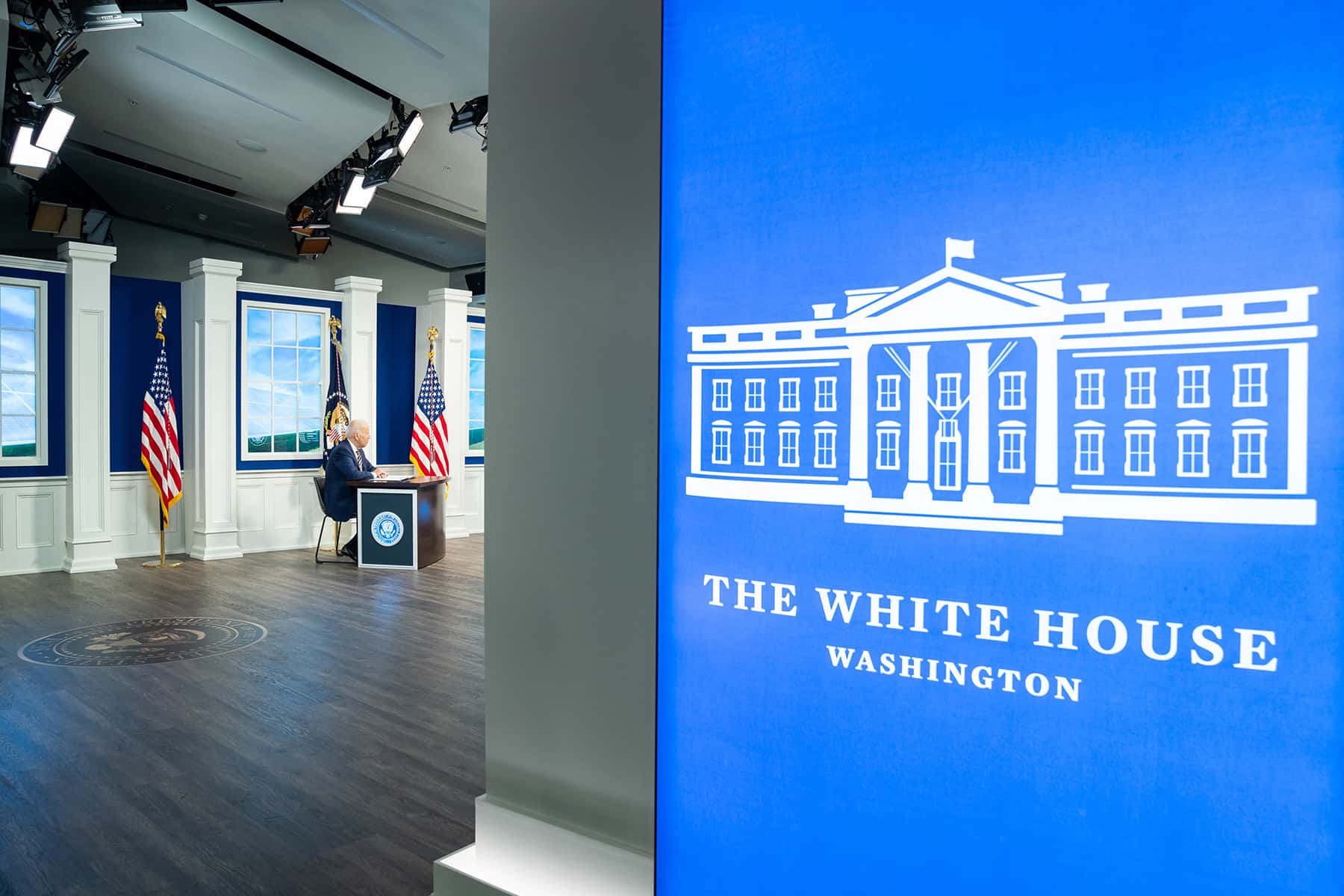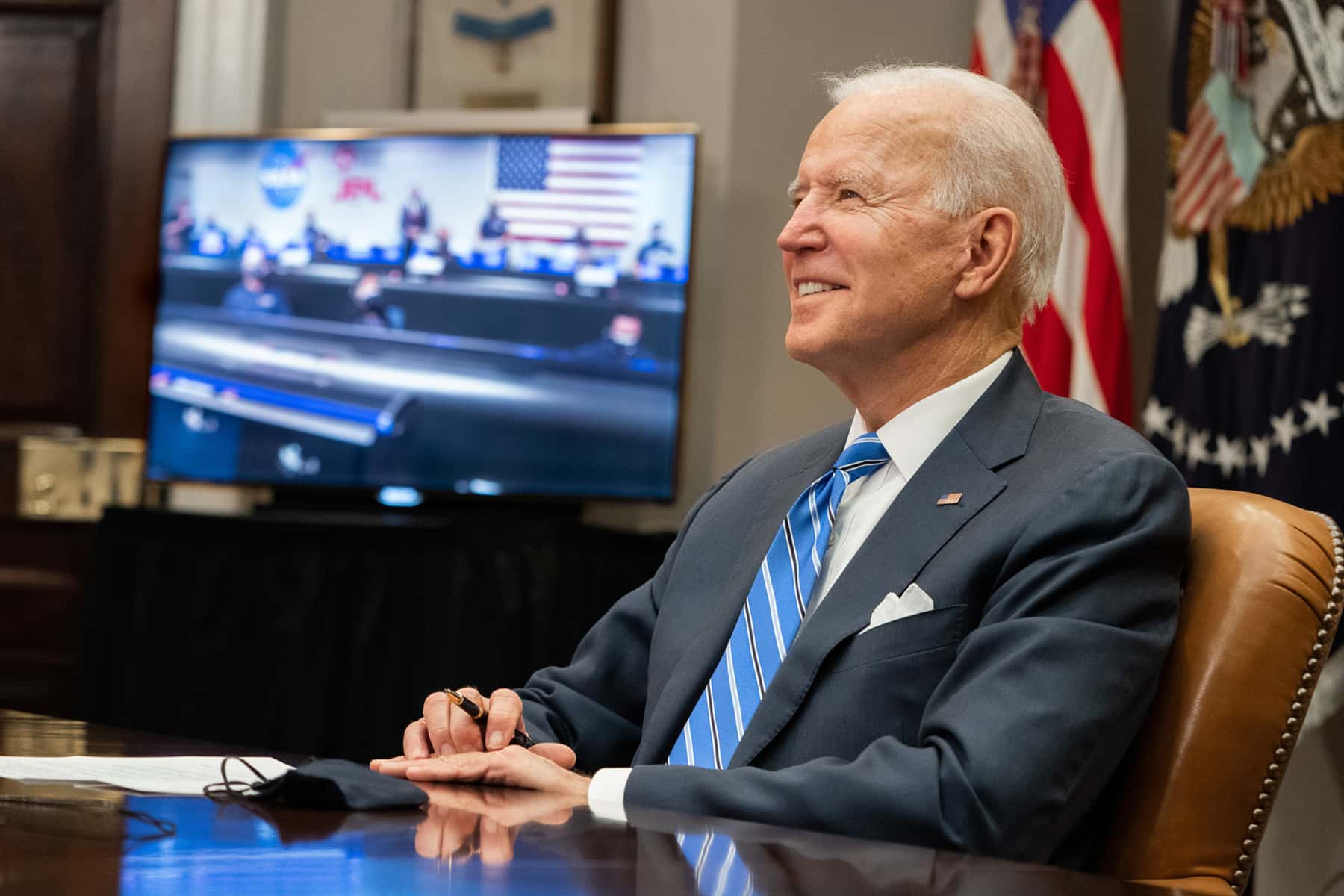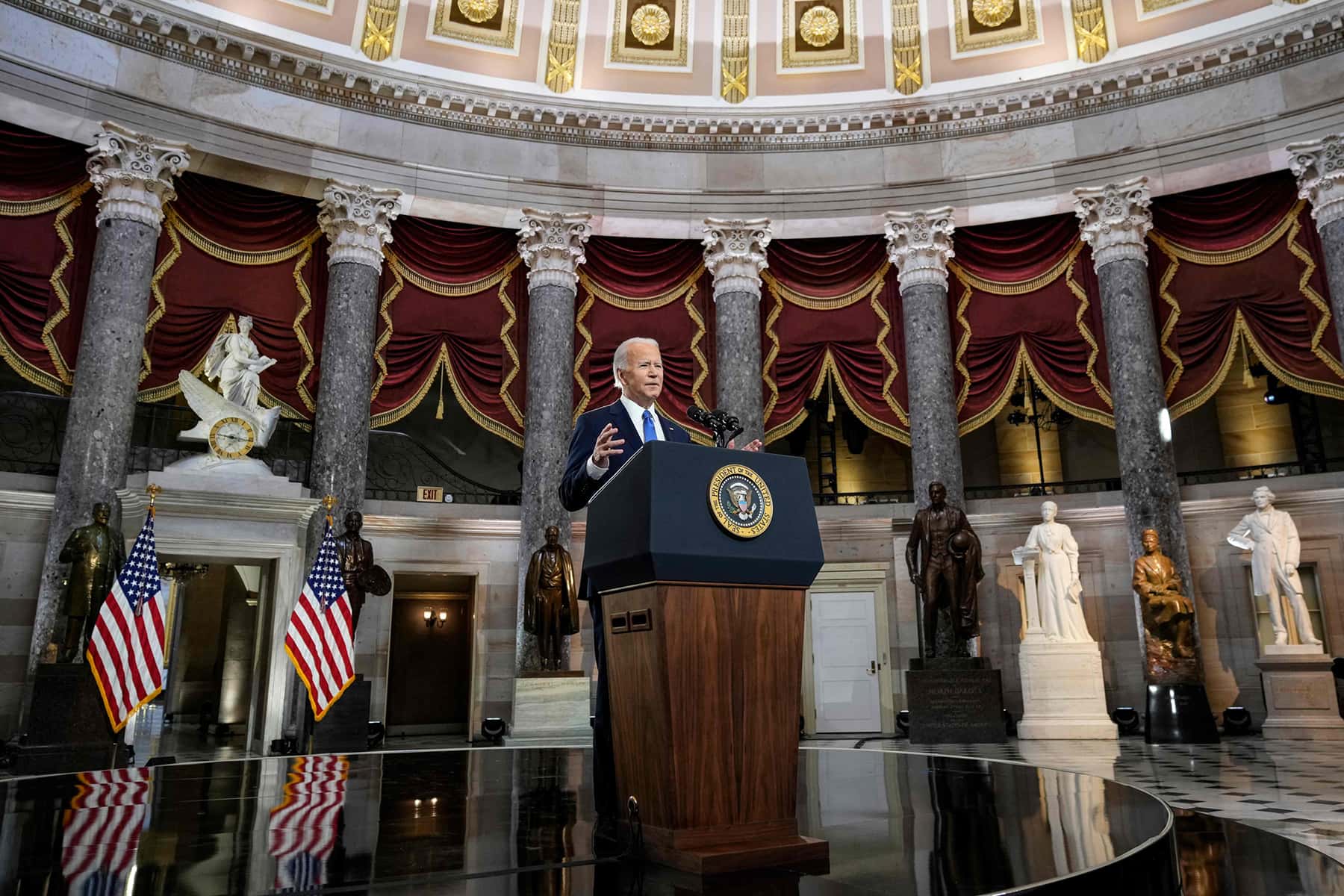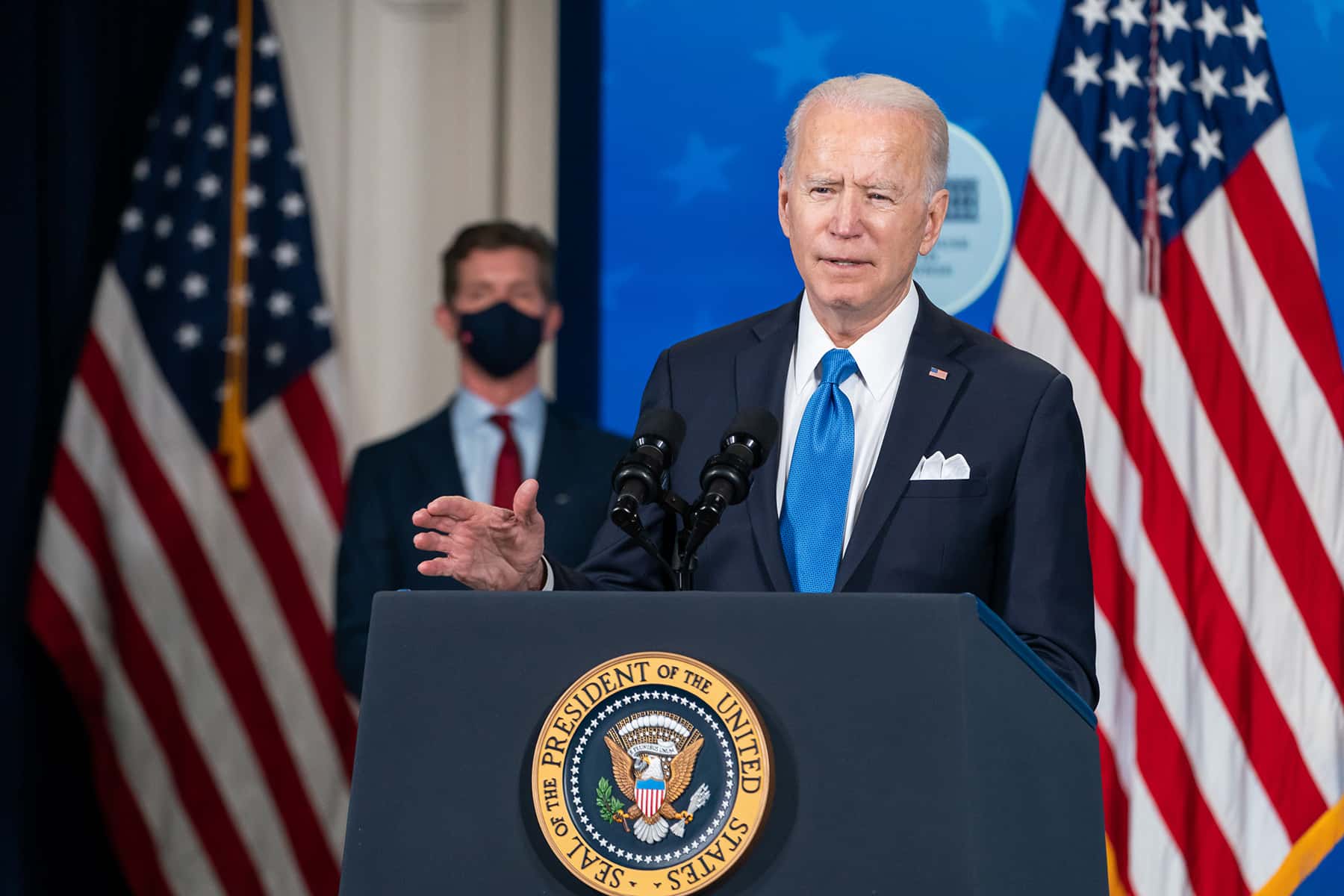
Joe Biden’s presidency is just over a year old. Biden has embraced the old idea, established by the Democrats under President Franklin Delano Roosevelt and the Republicans under President Dwight D. Eisenhower, that in a democracy, the federal government has a responsibility to keep the playing field level for all. It must regulate business to maintain competition and prevent corporations from abusing their employees, protect civil rights, provide a basic social safety net, and promote infrastructure.
Our forty-sixth president came into office in the midst of crisis. The coronavirus pandemic had killed more than 407,000 Americans, and the previous president’s quest to radicalize voters in spring 2020 had led to angry mobs rejecting the preventive measures other countries took. The economy was bottoming out as the pandemic killed workers, discombobulated workplaces, and disrupted supply chains. And the previous president was so determined not to give up power that he had incited his followers to attack Congress and the U.S. Capitol during the formal ceremony acknowledging Biden’s victory.
Even after the horrors of that day, 147 members of the Republican Party doubled down on the lie that Trump had really won the election. And when the Democratic House impeached Trump for inciting the insurrection, ending our country’s 224-year tradition of a peaceful transition of power, Republican senators acquitted him.
Republican lawmakers’ support for the Big Lie indicated how they would approach Biden’s presidency. They stand diametrically opposed to Biden, rejecting Democrats’ vision of the federal government. They are eager to return power to the states to do as they will, recognizing that the end of federal regulation will give far more freedom to people of wealth and that the end of federal protection of civil rights will, in certain states, permit white evangelical Christians to reclaim the “traditional” society they crave.
Biden set out to use government to make people’s lives better and, apparently, believed that successful policies would bring enough Republicans behind his program to ease the country’s extreme partisanship.
He fought the pandemic by invoking the Defense Production Act, buying more vaccines, working with states to establish vaccine sites and transportation to them, and establishing vaccine centers in pharmacies across the country. Vaccinations took off, and he vowed to make sure that 70% of the U.S. adult population would have one vaccine shot and 160 million U.S. adults would be fully vaccinated by July 4th.
At the same time, Democrats passed the $1.9 trillion American Rescue Plan to jump-start the economy by putting money into the pockets of ordinary Americans.The new law cut child poverty in half by putting $66 billion into 36 million households. It expanded access to the Affordable Care Act, enabling more than 4.6 million Americans who were not previously insured to get healthcare coverage and bringing the total covered to a record 13.6 million.
Money from those programs bolstered household savings and fired up consumer spending. By the end of the year, U.S. companies were showing 15% profit margins, higher than they have been since 1950. Companies reduced their debt, which translated to a strong stock market. In February, Biden’s first month in office, the jobless rate was 6.2%; by December it had dropped to 4.2%. This means that 4.1 million jobs were created in the Biden administration’s first year, more than were created in the 12 years of the Trump and George W. Bush administrations combined.
Then, in November, Congress passed a $1.2 trillion infrastructure bill that will repair bridges and roads and get broadband to places that still don’t have it.
U.S. economic output jumped more than 7% in the last three months of 2021. Overall growth for 2021 should be about 6%, and economists predict growth of around 4% in 2022—the highest numbers the U.S. has seen in decades, and higher than any other country in the world. Despite the increased spending, the federal budget deficit in the first quarter of fiscal year 2022 dropped 33% from that of 2021. The downside of this growth was inflation of up to 7%, but this is a global problem and exactly why it’s happening is unclear—increased spending has created pent-up demand, and prices have been unstable because of the pandemic.
Biden reoriented U.S. foreign policy to defend democracy. He immediately took steps to rejoin the World Health Organization and the Paris Climate Accords, and he and Secretary of State Antony Blinken worked hard to rebuild the North Atlantic Treaty Organization (NATO) and to replace our outdated focus on combating terrorism on the ground with combating it by defunding terrorists. Biden ended the unpopular 20-year war in Afghanistan and negotiated the exit of U.S. combat troops from Iraq, where we had been for more than 18 years. About 2500 U.S. personnel remain alongside their Iraqi counterparts to hold back remaining ISIS terrorists.
The end of those wars has also given Biden the room virtually to eliminate the U.S. use of drone strikes and airstrikes. In Trump’s first 11 months he authorized more than 1600 airstrikes; Biden has significantly tightened the process of authorization and has authorized 4.
Instead of focusing on soldiers, Biden dramatically increased the use of economic sanctions on international criminals and prosecutions for international criminal behavior to stop the flow of money to terrorists. Biden’s Treasury secretary, Janet Yellen, also helped to hammer out an international minimum tax that will help to close foreign tax shelters.
Biden is turning to these financial tools and the strength of NATO to try to stop another Russian incursion into Ukraine. He has warned Russian president Vladimir Putin that military aggression into a sovereign country will lead to crippling economic backlash, and U.S. ally Germany has put off approval of the valuable Nord Stream 2 gas pipeline Russia has constructed to Europe, worth tens of billions of dollars.
By any historical measure, Biden’s first year has been a roaring success, proving that democracy can, in fact, provide better lives for its people and can protect the rule of law internationally. And yet Biden’s popularity hovers in the low 40s.
Biden’s worldview demands that government accomplish things; the Republicans simply have to say no. They have focused on stopping Biden and the success of his view of government, and because it is only the Democrats who are in the arena, as President Theodore Roosevelt put it, Democrats are bearing the weight of popular discontent.
When the withdrawal from Afghanistan initially produced chaos as the Afghan government collapsed, Republicans hammered on the idea that Biden—and by extension a Democratic government—was incompetent. His numbers began to plummet, and the subsequent success of the largest human airlift in history did not change that narrative.
If Afghanistan happened organically, criticism of government could also be manufactured. In July, as the vaccination program appeared to be meeting Biden’s goals, Republicans began to insist that government vaccine outreach was government tyranny. Vaccination rates began to drop off just as the contagious Delta variant began to rage. When Biden tried to address the falling vaccination rates by requiring that federal workers and contractors, health care workers, and workers at businesses with more than 100 employees be vaccinated or frequently tested, Republicans railed that he was destroying American freedom.
Their argument took hold: by early December, 40% of Republican adults were unvaccinated, compared with fewer than 10% of adult Democrats, making Republicans three times more likely than Democrats to die of Covid. Rather than ending and giving Biden a historical success, the pandemic has continued on, weakening the economy and sparking chaos over masks and school reopenings as Republicans radicalize. Just last week, a woman in Virginia threatened to come to her child’s school with “every single gun loaded and ready” if the school board required masks.
That radicalization, stoked by Republican leaders, is at the point of destroying, once and for all, the idea of a government that works for the people. Republican leaders have stood by as Trump and his lackeys goaded followers into believing that Democratic governance is illegitimate and that Democrats must be kept from power. Following a playbook Republicans have used since 1994, Trump and his loyalists insisted—and continue to insist—on ongoing “audits” of the 2020 vote, knowing that seeing such “investigations” in the news would convince many voters that there must be something there, just as the 2016 ruckus over Secretary of State Hillary Clinton’s emails convinced many Americans that she had done something illegal.
It has worked. Although there is zero evidence of significant voter fraud, so far, 19 Republican-dominated states have passed 33 laws to make it harder for Democrats to vote, or to turn over the counting of votes to partisan Republicans. When Democrats tried to stop such a takeover of our democracy, all 50 Republicans in the Senate opposed federal protection of the right to vote. Two Democrats joined them in refusing to overrule the filibuster, thus dooming the law to fail. Now Republicans in three states have proposed election police forces to stop what they continue to insist — without evidence — are voting crimes.
And so, at the end of Biden’s first year — a year that by any standard must be called a success — Republicans are at the verge of achieving, at least for now, the end of the liberal democracy Americans have enjoyed since FDR and the Democrats embraced it in the 1930s, instead eroding the federal government and turning power over to the states.
In a two-hour press conference at the end of his first year, Biden said he did not anticipate the degree of obstruction he would face, and he expressed regret that he hadn’t “been able to…get my Republican friends to get in the game of making things better in this country….” “Think about this,” he said, “What are Republicans for? What are they for? Name me one thing they’re for.”
Senate Minority Leader Mitch McConnell has said that Senate Republicans will offer no legislative agenda before the 2022 elections and that he is “100 percent” focused “on stopping” Biden.
From the other side, Biden’s inaugural committee is celebrating the president’s first year in office with a video narrated by actor Tom Hanks in which ordinary Americans try to reclaim an older vision of an America in which we worked together for the good of all. They talk about how in the past year more than 200 million Americans have been vaccinated, how we have created more jobs in 2021 than in any year in the previous 80, how we lifted children out of poverty and are rebuilding roads and bridges, and how, historically, America is strong, courageous, resilient, and optimistic and can do anything, if only we will work together.
Аdаm SchυItz and Drеw Аngеrеr
Letters from an Аmerican is a daily email newsletter written by Heather Cox Richardson, about the history behind today’s politics

















